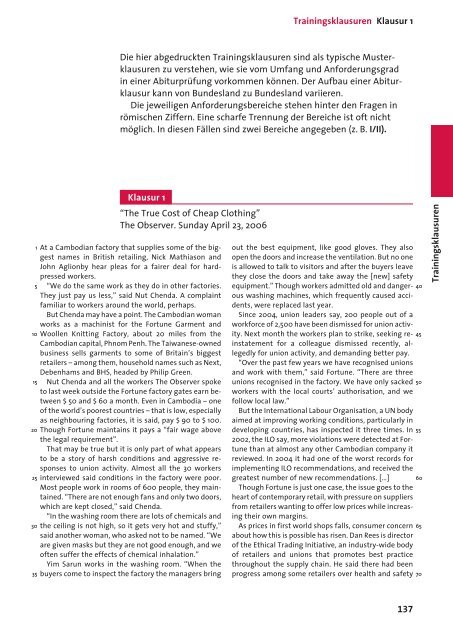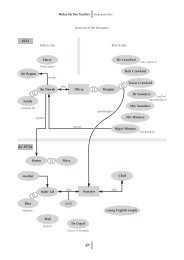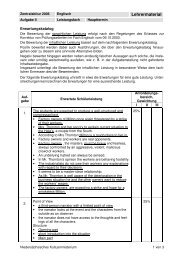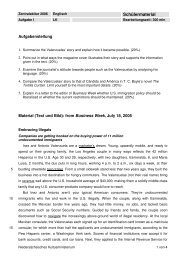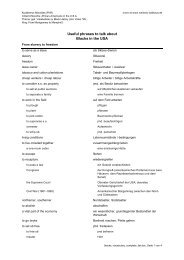Prüfungstraining Englisch Abitur - schule.bbs-haarentor.de www2 ...
Prüfungstraining Englisch Abitur - schule.bbs-haarentor.de www2 ...
Prüfungstraining Englisch Abitur - schule.bbs-haarentor.de www2 ...
Create successful ePaper yourself
Turn your PDF publications into a flip-book with our unique Google optimized e-Paper software.
1<br />
5<br />
10<br />
15<br />
20<br />
25<br />
30<br />
35<br />
Trainingsklausuren Klausur 1<br />
Die hier abgedruckten Trainingsklausuren sind als typische Musterklausuren<br />
zu verstehen, wie sie vom Umfang und Anfor<strong>de</strong>rungsgrad<br />
in einer <strong>Abitur</strong>prüfung vorkommen können. Der Aufbau einer <strong>Abitur</strong>klausur<br />
kann von Bun<strong>de</strong>sland zu Bun<strong>de</strong>sland variieren.<br />
Die jeweiligen Anfor<strong>de</strong>rungsbereiche stehen hinter <strong>de</strong>n Fragen in<br />
römischen Ziffern. Eine scharfe Trennung <strong>de</strong>r Bereiche ist oft nicht<br />
möglich. In diesen Fällen sind zwei Bereiche angegeben (z. B. I/II).<br />
Klausur 1<br />
“The True Cost of Cheap Clothing”<br />
The Observer. Sunday April 23, 2006<br />
At a Cambodian factory that supplies some of the biggest<br />
names in British retailing, Nick Mathiason and<br />
John Aglionby hear pleas for a fairer <strong>de</strong>al for hardpressed<br />
workers.<br />
“We do the same work as they do in other factories.<br />
They just pay us less,” said Nut Chenda. A complaint<br />
familiar to workers around the world, perhaps.<br />
But Chenda may have a point. The Cambodian woman<br />
works as a machinist for the Fortune Garment and<br />
Woollen Knitting Factory, about 20 miles from the<br />
Cambodian capital, Phnom Penh. The Taiwanese-owned<br />
business sells garments to some of Britain’s biggest<br />
retailers – among them, household names such as Next,<br />
Debenhams and BHS, hea<strong>de</strong>d by Philip Green.<br />
Nut Chenda and all the workers The Observer spoke<br />
to last week outsi<strong>de</strong> the Fortune factory gates earn between<br />
$ 50 and $ 60 a month. Even in Cambodia – one<br />
of the world’s poorest countries – that is low, especially<br />
as neighbouring factories, it is said, pay $ 90 to $ 100.<br />
Though Fortune maintains it pays a “fair wage above<br />
the legal requirement”.<br />
That may be true but it is only part of what appears<br />
to be a story of harsh conditions and aggressive responses<br />
to union activity. Almost all the 30 workers<br />
interviewed said conditions in the factory were poor.<br />
Most people work in rooms of 600 people, they maintained.<br />
“There are not enough fans and only two doors,<br />
which are kept closed,” said Chenda.<br />
“In the washing room there are lots of chemicals and<br />
the ceiling is not high, so it gets very hot and stuffy,”<br />
said another woman, who asked not to be named. “We<br />
are given masks but they are not good enough, and we<br />
often suffer the effects of chemical inhalation.”<br />
Yim Sarun works in the washing room. “When the<br />
buyers come to inspect the factory the managers bring<br />
out the best equipment, like good gloves. They also<br />
open the doors and increase the ventilation. But no one<br />
is allowed to talk to visitors and after the buyers leave<br />
they close the doors and take away the [new] safety<br />
equipment.” Though workers admitted old and danger- 40<br />
ous washing machines, which frequently caused acci<strong>de</strong>nts,<br />
were replaced last year.<br />
Since 2004, union lea<strong>de</strong>rs say, 200 people out of a<br />
workforce of 2,500 have been dismissed for union activity.<br />
Next month the workers plan to strike, seeking re- 45<br />
instatement for a colleague dismissed recently, allegedly<br />
for union activity, and <strong>de</strong>manding better pay.<br />
“Over the past few years we have recognised unions<br />
and work with them,” said Fortune. “There are three<br />
unions recognised in the factory. We have only sacked 50<br />
workers with the local courts’ authorisation, and we<br />
follow local law.”<br />
But the International Labour Organisation, a UN body<br />
aimed at improving working conditions, particularly in<br />
<strong>de</strong>veloping countries, has inspected it three times. In 55<br />
2002, the ILO say, more violations were <strong>de</strong>tected at Fortune<br />
than at almost any other Cambodian company it<br />
reviewed. In 2004 it had one of the worst records for<br />
implementing ILO recommendations, and received the<br />
greatest number of new recommendations. […] 60<br />
Though Fortune is just one case, the issue goes to the<br />
heart of contemporary retail, with pressure on suppliers<br />
from retailers wanting to offer low prices while increasing<br />
their own margins.<br />
As prices in first world shops falls, consumer concern 65<br />
about how this is possible has risen. Dan Rees is director<br />
of the Ethical Trading Initiative, an industry-wi<strong>de</strong> body<br />
of retailers and unions that promotes best practice<br />
throughout the supply chain. He said there had been<br />
progress among some retailers over health and safety 70<br />
137<br />
Trainingsklausuren


